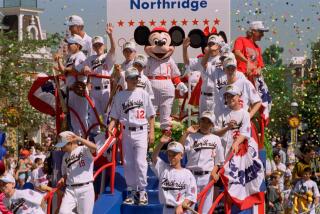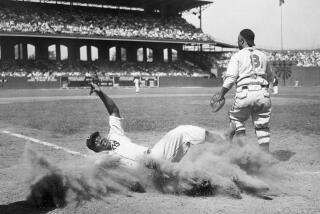Baseball Blues : Nicaragua: the National Sport Slides
- Share via
MANAGUA, Nicaragua — Baseball might seem a secondary concern for a country engulfed in a guerrilla war and an economic crisis. Yet, amid those other miseries, Nicaragua is suffering from a bad case of baseball blues.
The once-proud national all-star team, the Seleccion Nacional, has made a dismal showing this year in the three major international tournaments it has played.
In the process, Nicaragua’s national pastime has become a national disappointment. Fans and sportswriters are indignant and angry.
“We consider it a great tragedy,” said Roberto Sanchez, a sportswriter for the opposition newspaper La Prensa.
Decline Tied to Sandinistas
He dates the decline of Nicaraguan baseball from 1979, when the Sandinistas seized power in an insurrection against the dictatorial government of President Anastasio Somoza Debayle.
“What we could call the debacle began after the triumph of the revolution,” he said.
The Sandinista Front, the government party, has put its people in charge of the organizations that are responsible for baseball. But “they have shown no capacity,” Sanchez complained.
The Sandinistas brought in advisers and coaches from Cuba, where amateur baseball is also the national sport. “They didn’t produce, because their teaching system was grossly deficient, too theoretical,” Sanchez said.
After the Seleccion lost all but one game in a Canadian tournament in August, even the Sandinista newspaper Barricada said a “true revolution in baseball” was needed.
Changes Advocated
In a front-page commentary, Barricada called for a “complete change in the leadership structures, organization and working methods of Nicaraguan baseball.”
It isn’t that the Sandinistas have neglected baseball--they have showered it with attention.
“Now there is more support than before, and less results,” said Edgard Tijerino, baseball writer for Barricada. “When you say that, people get upset politically, but it’s the truth.”
All 10 of Nicaragua’s “first-division” teams are given government subsidies. Though they are officially amateurs, the players receive housing, food, medical care, per-diem expense money and other benefits.
Several of the nine Sandinista “commanders of the revolution” have taken teams under their wings, looking out for their welfare and progress.
Commander Tomas Borge, the interior minister, is honorary president of Boer, Nicaragua’s oldest team. Commander Humberto Ortega, the defense minister and brother of President Daniel Ortega, sponsors the Dantos team but tries to help them all.
“Commander Ortega, Humberto, keeps up on all of the problems of baseball and tries to resolve them,” sportswriter Tijerino said.
Dantos, the team of the Sandinista People’s Army, won the national championship this year. “Danto” was the nom de guerre of German Pomares, a Sandinista guerrilla commander who was killed in the 1979 insurrection.
The army also operates a factory that makes baseballs, mitts and bats. The brand: Danto.
Carlos Cuadra, the commissioner of Nicaraguan baseball, reached into his desk drawer the other day and pulled out a new, grayish-leather Danto baseball with red stitching.
“This is a miraculous ball,” he said, gripping it firmly and waving it proudly over the desk. “For me, this is the best example that things can get done.”
Nicaragua began manufacturing baseball equipment four years ago to save increasingly scarce dollars needed for other imports. Cuadra said the country might have to do without baseballs if it were not for the factory.
‘Dead’ Ball Critics
Some critics contend that baseballs made here are “dead” and that Nicaraguan players are doing poorly in international competition partly because they are not used to the livelier American balls used in the tournaments.
“We have to improve it, but it isn’t a completely dead ball,” Cuadra said. “It isn’t the best ball in the world, but it is our ball.”
Cuadra, 29, said Nicaraguan baseball’s main problem is that during its heyday in the 1970s, the development program was concentrated on only about 30 of the best players at any one time. “Once these boys got older, who came along to replace them? No one,” he said.
In time, the Sandinistas plan to train expert coaches and develop a a high-quality youth baseball program in the country’s high schools, Cuadra said. “The public is angry now, but in three years or five years, they will agree with what we are doing,” he said.
Meanwhile the national baseball federation has expanded the schedule of first-division teams to give them more competitive experience. And it plans to start next year’s national season nearly two months earlier, leaving more time at the end for the all-stars of the Seleccion to practice together for international competition.
“All of this is being done in very difficult conditions,” Cuadra said, referring to the war being waged by U.S.-supported rebels and the country’s economic crisis. “To have good sports, you need peace,” he said.
Since the 1890s
Nicaraguan baseball began in the 1890s as an upper-class pastime. Young men who had played as college students in the United States came home and founded this country’s first team, the “Managua Base-Ball Club” in 1891.
In 1905, U.S. Consul Carter Donaldson sponsored a new team in Managua. It was named Boer, after the South African settlers who fought the British in the Boer War.
Other teams formed around the turn of the century included three named New York, Manchester, and Chicago. Boer is the only one of those early teams that survives today.
In the late 1920s and early 1930s, a U.S. Marine contingent in Nicaragua spearheaded government troops fighting a rural war against rebels led by Gen. Augusto Cesar Sandino. Marine interest in baseball is said to have further popularized the sport.
The Marines left in 1933 after training a new army, the National Guard, and putting it under the command of Gen. Anastasio Somoza Garcia. He soon became president, and the Somoza family held power until his son, Anastasio Somoza Debayle, fled the country in 1979.
The government subsidized a small league of professional baseball teams in the 1950s and 1960s. They drew many of their players from Triple-A baseball in the United States during the American off-season.
Nicaraguan Golden Age
But professional baseball in Nicaragua collapsed in the mid-1960s when government funding dried up.
The golden age of Nicaraguan amateur baseball began in 1972, when the country played host to the world championship tournament.
Carlos Garcia, founder and then president of the Nicaraguan Baseball Federation, organized the tournament and also prepared the Nicaraguan team to compete in it. Garcia brought in coaching talent from U.S. baseball, including Cuban exiles Tony Castano and Pedro Ramos.
The Nicaraguans finished second in the 1972 world championships and continued to shine through the 1970s. (Garcia was not so lucky. Under the Sandinistas, he was sent to jail in 1980 for counterrevolutionary activities; released in 1984, he left the country.)
From that decade of success came five Nicaraguan players who made the major leagues in the United States. Two of them, pitcher Dennis Martinez of the Baltimore Orioles and first baseman David Green of the San Francisco Giants, are still in the majors.
Their performances in every game are carefully recorded on the sports pages of Nicaraguan newspapers.
The newspapers devote large amounts of space to the U.S. National League and American League playoffs and to the World Series. The World Series was televised here until last year, when government television officials decided that the country could no longer afford to pay for the broadcast rights.
Censorship on Salaries
Unlike Cuba’s Communist government, the Sandinistas do not discourage interest in U.S. professional baseball. They have, however, asked Barricada not to publish the amounts of salaries and bonuses paid to major league players.
The official policy is not to aid in the recruitment of Nicaraguans for U.S. professional baseball. Nicaraguan athletes, in the Sandinista view, should play for the glory of Nicaragua.
“They have a very socialistic view of athletes, and they don’t appreciate people coming in from professional teams and luring their players away,” a foreign diplomat said. He added that a Canadian baseball scout was refused entry to Nicaragua several months ago.
But as Nicaragua’s baseball prestige has dipped, so has the interest of professional baseball scouts. Cuadra said he has heard of no scouts in Nicaragua since he became baseball commissioner at the beginning of the year.
More to Read
Go beyond the scoreboard
Get the latest on L.A.'s teams in the daily Sports Report newsletter.
You may occasionally receive promotional content from the Los Angeles Times.










